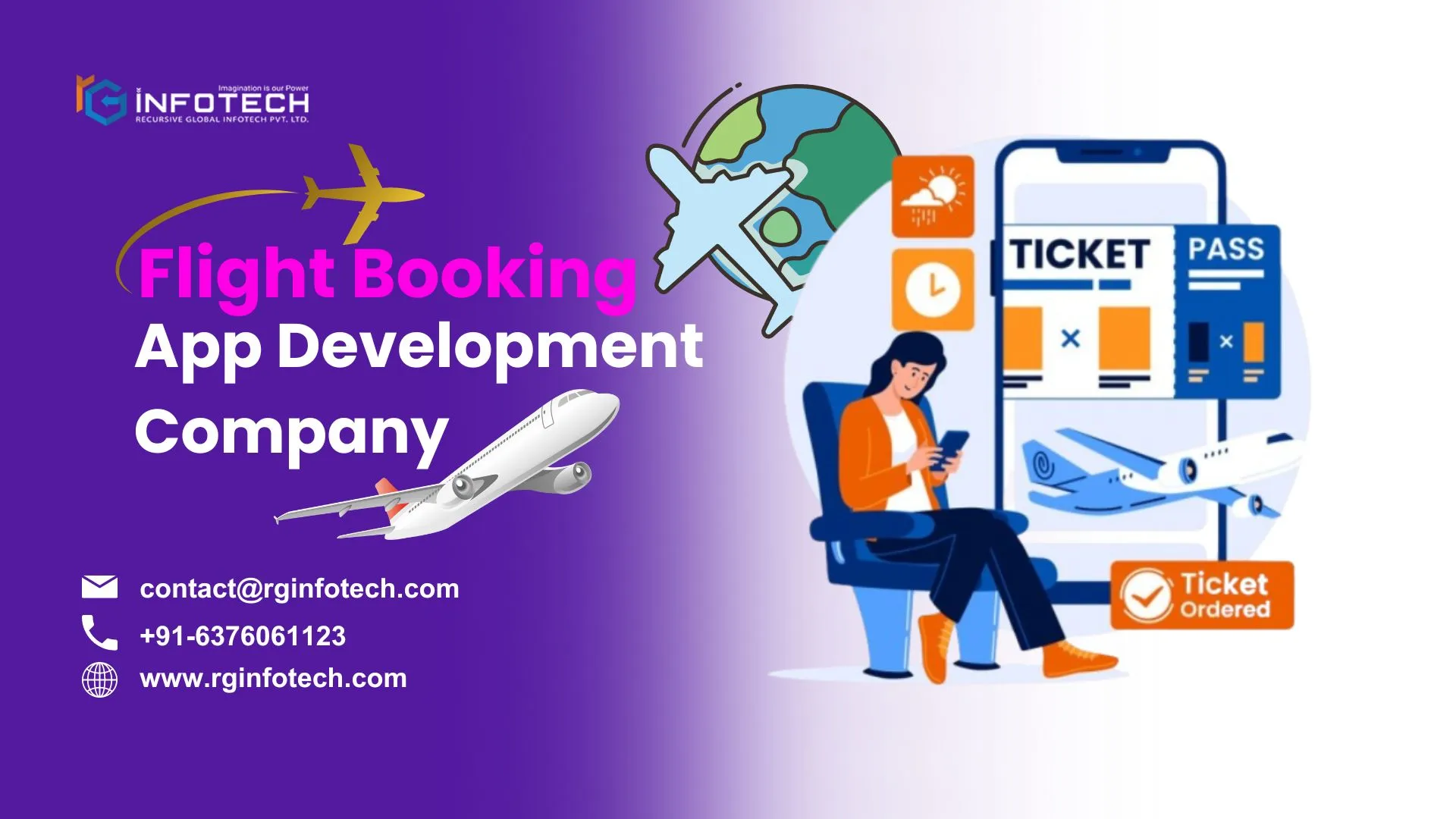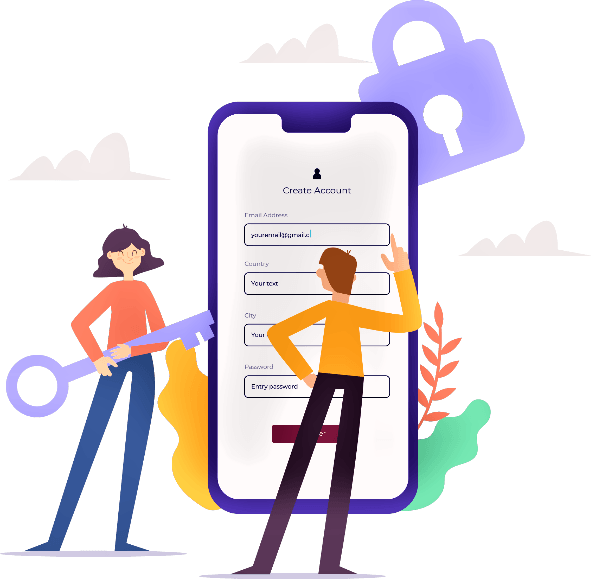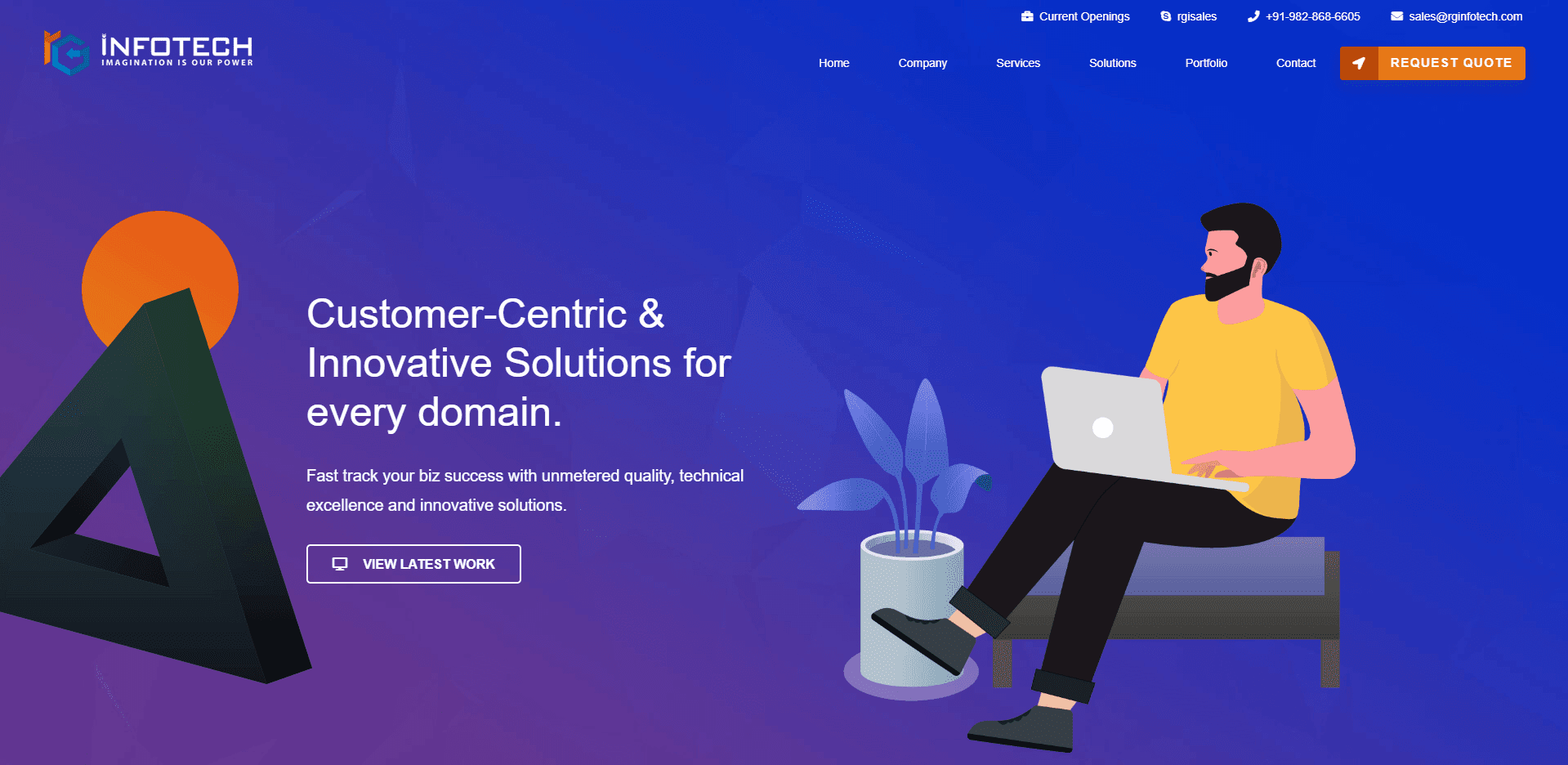Flight Booking App Development Company

A flight booking application is a tool that makes it easy for users to make reservations for flight tickets online. The mobile applications are highly convenient and let travelers around the globe book flights, track the status of flights, download tickets, and manage their travel details, all with just a few taps on their mobile phones.
Some flight reservation apps offer price comparison functionality, which is very popular among travelers nowadays. Mobile solutions made trips by air more accessible, transparent, and easier – key characteristics modern travelers appreciate.
Now, any flight booking app development company needs to follow this trend and create applications that enable users to search, compare options, and seamlessly reserve flights and offer them a seamless travel experience. This blog will guide you through the crucial aspects of custom flight booking app development, and introduce the key factors that may affect its success.
Looking an app for your business?
Let’s discuss your idea with us on coffee.
What Do You Mean by A Flight Booking App?
Before we move on to the features and other important components, let’s first examine what flight booking app development stands for. Applications for flight bookings are expressly made to make the internet search, comparison, and booking procedure easier. By allowing users to enter their travel information, view available flight options, and make bookings all in one place and without hassle, these applications provide users with amazing experiences.
An app for booking flights has several functionalities. Some of the crucial features and functionalities needed to build a flight booking mobile app are the choice to save booking details for later use, real-time pricing changes, seat selection, and real-time updates. In addition, it enables users to manage their trip plans, and flight schedules, and follow flight statuses, making the entire travel planning process more efficient, personalized, and user-friendly.
What Are The Crucial Features of Flight Booking App Development?
You need to incorporate well-refined and advanced features during Flight booking app development. These crucial feathers will ensure fluency in functionality and a seamless user experience. The features must not only incorporate basic functionalities like searching and booking but also effectively enhance operational functionality.
Flight Search
A robust flight search functionality enables users to check for available flights and find the suitable one by considering parameters such as dates, destination, and price range. App development incorporates advanced filtering options to help users find the most suitable flights in no time, improving overall usability and satisfaction.
Booking and Reservation
The booking and essential feature is quite essential, enabling users to secure their flight with a simple and secure process. This functionality should include selecting flights, entering passenger details, and choosing payment methods. Ensuring a smooth transaction experience for users.
Real-time Flight Information
Providing real-time fight updates, including status changes, delays, and cancellations, is crucial for keeping users informed. Any Flight Ticket Booking App Development Company would understand the importance of this feature and it greatly enhances the customer experience by allowing travelers to adjust their plans proactively depending on the most current information.
Notifications and Alerts
Integrating notifications and alerts for price changes, booking confirmations, and other updates keeps users engaged and informed. This feature can significantly improve user interaction, helping users to stay updated about their bookings.
User Profiles
The user profile feature allows users to create their profiles while enhancing personalization and simplifying the booking process. By saving their preferences, previous flight information, and frequently used details, the app can streamline the user experience on subsequent visits, making it more convenient for travelers.
Integration with the Travel Ecosystem
Allow users to book hotels and rental cars alongside their flights, providing a one-stop solution for all travel needs. Users can easily add travel insurance during the booking process, offering peace of mind and added convenience.
Secure Payments
It is important to add a secure payment system while considering flight tickets booking app development. It protects users’ financial details during transactions. It is important to implement reliable payment gateways and encryption methods to install trust and ensure a safe booking process for users.
Itinerary Management
Itinerary management allows users to view and manage their booking details in one place. Users can check their flight status, make changes to their bookings, or access their e-tickets conveniently, thereby enhancing user satisfaction.
Customer Support
Offering various channels for customer support, such as in-app chat, email, or phone assistance, is essential for addressing user queries and issues. This feature helps to enhance user trust and loyalty to the app by ensuring that help is readily available if issues arise.
Additional Features
Incorporating advanced features such as price comparison, mobile check-in, and loyalty program integration can provide extra value for users. For example, price alert notifications can help users take advantage of the best deals, while loyalty program features can enhance user retention.
Flight Booking App Development Process
Developing a flight booking app involves a structured process that ensures the creation of a reliable, user-friendly, and efficient application. Here’s a detailed overview of the typical steps involved in the flight booking app development process:
Market Research and Analysis
-
-
-
- Understanding the Market: Conduct thorough research on the travel industry, focusing on current trends, user needs, and competitor analysis. Identify key features that are in demand and gaps in the market that your app could fill.
- Target Audience Identification: Define your target audience, considering factors such as demographics, travel habits, and preferences. This helps in tailoring the app to meet the specific needs of your users.
-
-
Defining the App's Scope and Features
-
-
-
- Feature List Creation: Based on your market research, create a comprehensive list of features your app will offer. Prioritize essential features like flight search, booking, payment integration, and user profiles.
- Technology Stack Selection: Choose the appropriate technologies for the front-end, back-end, and database. Consider factors like scalability, security, and performance when selecting programming languages, frameworks, and databases for Flight Booking Mobile App Development.
-
-
UI/UX Design
-
-
-
- Wireframing and Prototyping: Start with wireframes to outline the app’s structure and flow. Move on to creating prototypes that showcase the app’s design and user interface.
- User Experience (UX) Design: Focus on creating an intuitive and seamless user experience. The design should prioritize ease of navigation, quick access to essential features, and a smooth booking process.
- User Interface (UI) Design: A well-crafted user interface is key to the success of a flight booking app UI. Design visually appealing and responsive interfaces that enhance user engagement. Ensure the design is consistent across all screens and devices.
-
-
Backend Development
-
-
-
- Server-Side Development: Develop the backend of the app, which includes setting up the server, database, and APIs. Ensure the backend is scalable to handle large volumes of users and transactions.
- Database Design: Design a robust database that efficiently stores user data, flight information, booking details, and payment records. Ensure data security and privacy are prioritized.
- API Integration: Integrate third-party APIs for flight data, payment gateways, notifications, and other essential services. This enables real-time data updates and smooth transactions.
-
-
Frontend Development
-
-
-
- Mobile App Development: Develop the front end for both Android and iOS platforms. Ensure the app is optimized for different screen sizes and provides a consistent experience across devices.
- Web App Development (if applicable): If you’re also developing a web version, ensure the design and functionality are consistent with the mobile app. Use responsive design to adapt to various screen sizes.
-
-
Testing and Quality Assurance
-
-
-
- Unit Testing: Test individual components of the app to ensure they function correctly. This includes testing the flight search, booking, payment processing, and notification features.
- Integration Testing: Test the integration of various components and APIs to ensure they work together seamlessly. This step is crucial for identifying and fixing issues that may arise from API integrations.
- User Acceptance Testing (UAT): Involve real users in testing the app to ensure it meets their expectations and provides a smooth user experience. Collect feedback and make necessary adjustments.
- Security Testing: Conduct thorough security testing to identify and fix vulnerabilities. Ensure the app complies with data privacy regulations like GDPR.
-
-
Deployment
-
-
-
- App Store Submission: Once testing is complete, prepare the app for submission to the Google Play Store and Apple App Store. Follow the guidelines for each platform to ensure your app is approved.
- Web Hosting (if applicable): If you’ve developed a web version, deploy it on a reliable hosting service. If you develop a flutter flight booking app, ensure the hosting service can handle high traffic volumes and provide adequate security.
-
-
Post-Launch Support and Maintenance
-
-
-
- Monitoring and Bug Fixing: After launch, monitor the app’s performance and user feedback. Quickly address any bugs or issues that arise.
- Regular Updates: Continuously update the app to improve performance, add new features, and stay compatible with the latest mobile OS versions.
- Customer Support: Provide users with ongoing customer support to assist with any issues or questions. This helps build trust and loyalty among users.
- Continuous Optimization: Use the insights from analytics to optimize the app’s performance, user experience, and feature set. Regularly update the app based on user feedback and industry trends.
-
-
How Much Does it Cost of Developing A Flight Booking App?
Estimating the exact cost of developing a flight booking app can indeed be complex, as it depends on various factors such as the app’s complexity, features, and development team. On average, the flight booking app development cost ranges from $15,000 to $80,000 or even higher. Here’s an approximate cost breakdown based on different aspects of mobile app development:
Flight Ticket Booking Mobile App Development Cost Breakdown Details
Project Planning and Market Research ($6,000 – $8,000)
This involves understanding market needs, defining project scope, and strategic planning to ensure the app aligns with business goals and user expectations.
UI/UX Design ($6,000 – $10,000)
It includes creating wireframes, prototypes, and final designs to ensure a user-friendly and visually appealing app interface.
Frontend Development ($5,000 – $25,000)
This section covers the development of the app’s user interface and user experience on mobile platforms (iOS and Android). The cost varies based on complexity and the number of platforms.
Backend Development ($5,000 – $20,000)
It involves building the server-side components, databases, and application logic that power the app’s functionality and integrate with external services.
API Integrations ($2,000 – $10,000)
This part includes integrating third-party services such as flight data providers, payment gateways, and notification systems.
Testing and QA ($2,000 – $10,000)
Testing and QA encompass various testing phases to ensure the app functions correctly, is free of bugs, and provides a smooth user experience.
Deployment and Launch ($1,000 – $5,000)
Covers the costs of deploying the app to app stores and ensuring that it meets all requirements for publication.
Post-Launch Maintenance (1 Year) ($500 – $5,000)
The post-launch maintenance includes ongoing support, updates, and bug fixes after the app is launched.
Engagement Models
-
-
-
- Fixed Price Model: Ideal for projects with well-defined requirements. The total cost is agreed upon upfront, and any additional changes may incur extra charges.
- Dedicated Development Team: The cost depends on the team’s size, the project’s duration, and the expertise required. This model offers flexibility and allows you to scale the team as needed.
-
-
For an accurate estimate tailored to your specific project, it’s recommended to contact a Mobile App Development Company like RG Infotech. They can provide a detailed proposal based on your project’s unique requirements, scope, and desired features.
Conclusion
The custom flight booking app development is a strategic move that offers immense potential for growth and success in the travel sector. By focusing on innovative features and user-centric design, businesses can achieve a strong market presence and reap the benefits of increased revenue and brand recognition. Stay tuned with us for more updates.
Frequently Asked Questions (FAQs)
Select a development team based on their:
-
-
-
- Experience: Look for expertise in flight booking or similar apps.
- Portfolio: Review past projects to assess their capabilities.
- Reputation: Check client reviews and testimonials.
- Technical Skills: Ensure they have the skills required for your app’s features.
- Communication: Choose a team that communicates effectively and understands your needs.
-
-
The development time for a flight booking app can vary widely based on complexity and features. On average, the development process can take between 3 to 6 months. This includes phases such as planning, design, development, testing, and deployment.
Define various subscription tiers with clear benefits, offer free trials, communicate value, and regularly update content based on user feedback.
Revenue can be generated through commissions on bookings, premium listings, in-app ads, subscription models, ancillary services, affiliate marketing, data monetization, in-app purchases, and loyalty programs.



 rgisales
rgisales



